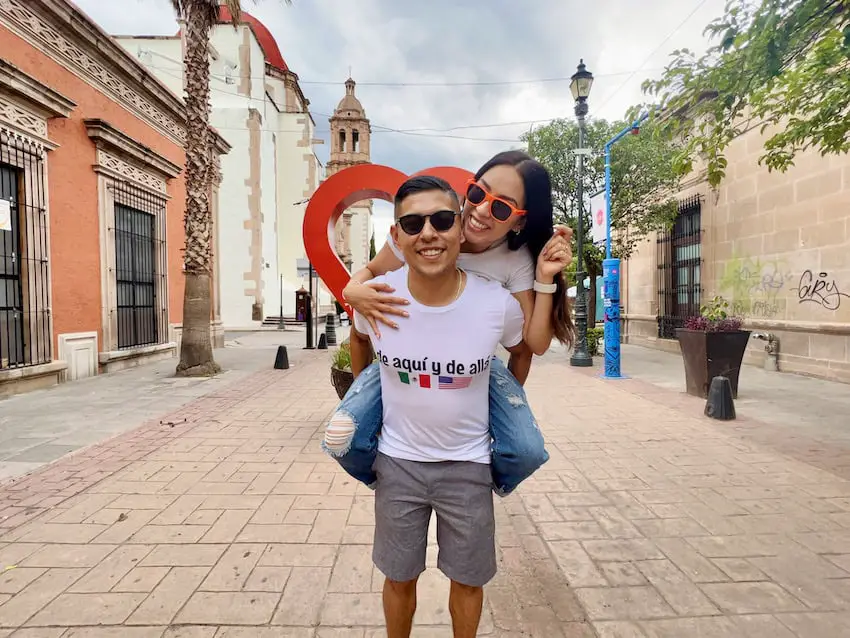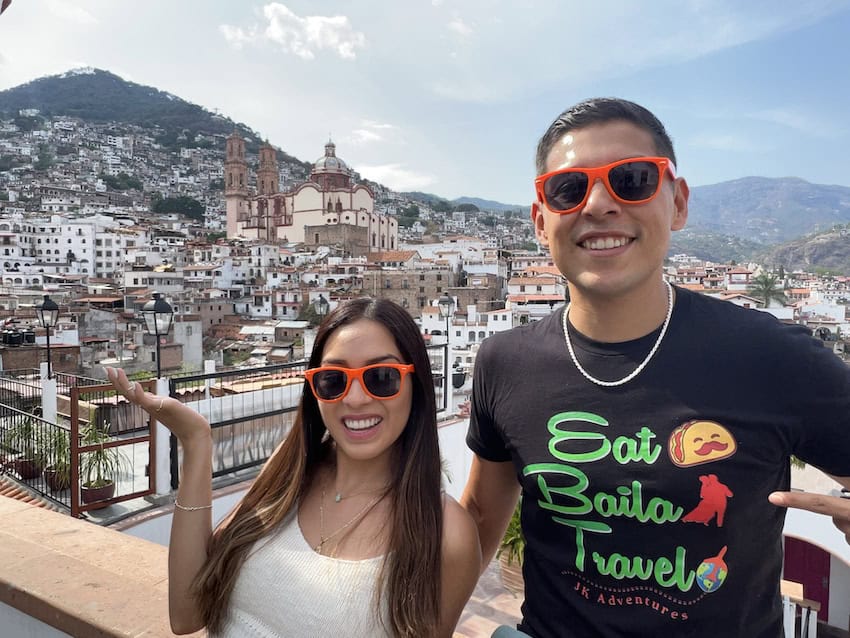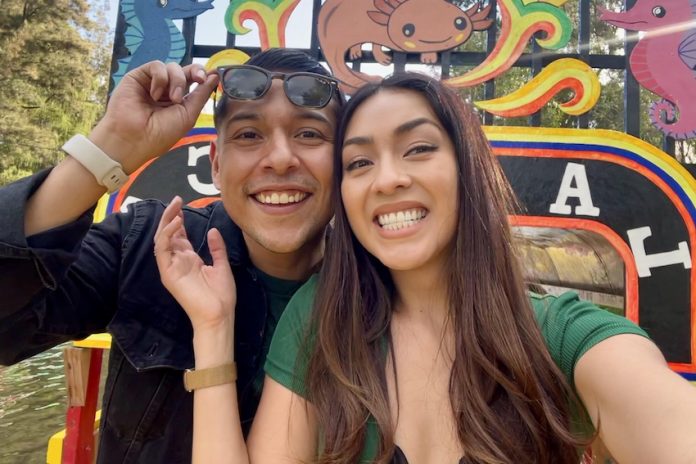In our series “My American Dream is in Mexico”, we explore the growing phenomenon of Mexican-Americans who were born or raised in the U.S. yet have chosen to pursue their adult dreams in Mexico. Each feature seeks to uncover their motivations, experiences, and the connections they’re rediscovering in the country their parents left long ago in search of a better life and more opportunities. Today, we are profiling Jenny Frausto-Aguayo and Kevin Frausto of the Eat Baila Travel YouTube channel.
The couple have roots in Chicago but are planning to settle in Mexico for the long haul. We discussed their backgrounds, identity, the privilege of being bilingual and bicultural, and their plans for the future.

Age: 30 and 36
Location: Mexico City and Puerto Escondido
Occupation: YouTube Content creators and Project Manager (Kevin)
Roots in Mexico: Zacatecas (Jenny), Veracruz and San Luis Potosí (Kevin)
Why did you move to Mexico?
Jenny: “Early on when we got married we talked about leaving the U.S. and Mexico was always an option but we thought something further afield like Spain or Brazil. In 2018, we visited Playa del Carmen and Mérida and we met foreigners living and thriving in Mexico. When we realized that people who had no heritage or family connection to Mexico were living there, we saw ourselves doing the same thing. We thought, why not us? We already have the cultural connection and the opportunities to thrive are there. Our goal was to move to Mérida in 2020, since it made so much sense — we have the cultural connection and Mexican citizenship. But when the pandemic hit, we postponed until 2021 to keep working and saving up.”
Kevin: “I used to travel to Mexico a lot as a kid — like two or three times a year, our family would drive down there together. But in 2006, when cartel violence escalated, we stopped going altogether. My perception of Mexico changed because of that and because of my mom’s fears. So, when Jenny started talking about moving to Mexico, I thought she was crazy! But when we took that trip in 2018, it helped me see that, while Mexico wasn’t as safe as it had been before 2006, it wasn’t as unsafe as I’d thought either.”
How did your parents react when you told them you were relocating to Mexico?

J: “They brushed it off. We told them a year in advance, and at first, they thought we were joking or just talking about a dream we’d never actually pursue. When they realized we were serious, the concerns started. They couldn’t understand why we’d want to move to a country they saw as unsafe based on the news they watched. We had many conversations to help them warm up to the idea, explaining that, just like in Chicago, Mexico has both safe and unsafe areas.”
K: “For my mom, it eased her mind that we started in Veracruz with her family, where we stayed for two months to settle in. After that, we traveled nomadically for the rest of 2021 and 2022, spending an extended period in Puerto Escondido.”
What inspired you to start your YouTube channel?
J: “We started our YouTube channel as a way to embrace our Mexican-American identity, and how we navigate that as individuals who are exploring their heritage country. We were looking for a place to live, but at the same time, we wanted to absorb all the history and important figures we didn’t learn about growing up — like La Malinche, Miguel Hidalgo, and others. We also wanted to showcase how beautiful Mexican culture is and share our learning experience with people on our YouTube channel and hope that other Mexican-Americans can feel empowered to embrace their culture as much as we do”.
In what ways have you reconnected with your Mexican roots?

K: “For me it’s been about figuring out my identity. It’s come full circle. When I was a kid, I traveled to Mexico frequently — both to San Luis and Veracruz, which are very different from each other. The culture I grew up with in Chicago also differed greatly from that of my Mexican peers and American colleagues at school and work. Now it feels complete, and I take pride in identifying as a Mexican from Chicago. Spending so much time in Mexico has taught me so much about my family and myself — insights I probably would never have gained if I hadn’t left Chicago.”
How do Mexicans in Mexico perceive your identity?
J: “It’s very funny. We got the first taste from our family in Veracruz because we speak fluent Spanish and they were shocked. They were like: “You don’t sound like other pochos, who have more broken Spanish.” Their reaction highlighted how we were breaking their preconceived notions of what Mexican-Americans are like. Also, on YouTube, we’ve gotten hate comments from Mexicans saying we’re not really Mexican and also from Americans telling us we’re not American.”
What does the word “pocho” mean to you and have you been called it?
J: “It’s a term often used derogatorily. Some people have chosen to embrace it and give it a positive spin, but it still bothers me when others use it to describe me. The word ‘pocho,’ as I understand it, has roots meaning something that is rotten — like a spoiled piece of fruit. It implies that we’re not good enough. We’re not good enough to be Mexican and we’re not good enough to be American either. So they put us in this limbo place that we like to call ‘ni de aquí ni de allá’ (neither from here nor there) but we’ve given it a spin and we like to say ‘de aquí y de allá’ (from here and there), because we belong to both cultures.”
Tell me more about what the phrase ‘de aquí y de allá means to you?
K: After spending so much time in Mexico, we truly feel at home here. The transition was much easier than we expected. At the same time, Chicago will always be home for us too. We feel comfortable in both places. We adopted the phrase because we’ve always felt we belong to both cultures rather than feeling like we don’t belong to either. In Mexico, we’re seen as American while in the U.S., we’re viewed as Mexican. Our constant travel between the two has shown us that both places are our home. We literally have citizenship in both countries, so we can proudly claim both, despite what others may say.”
In what ways has being bilingual and bicultural enriched your experience in Mexico?
J: “We feel like we have superpowers being fluent in two languages and bringing perspectives from both countries, though probably a bit more from the U.S.! We came to Mexico eager to learn and absorb what it has to offer. Mexico has so much to teach us and we aim to take the best from both worlds. That’s what ‘de aquí y de allá’ embodies — it’s a combination of ‘yes, and this.’ We blend the best of both to create the most fulfilling life we can. I believe that’s what our ancestors would have wanted for us: to see us happy and thriving, not struggling for basic needs. If we have the opportunity to live in the country they’ve called home for generations, why wouldn’t we?”
What is next for Jenny & Kevin?
K: “A couple of years ago, we bought land in Puerto Escondido near La Punta and we want to drive our car from Chicago to California then down to Baja and then put the car in a ferry to the coast to then make the trek to Oaxaca. Our goal is to turn the land into a home and possibly start a business, though we’re still brainstorming ideas. We might dive into this project right away or take one last taste of digital nomad life before we settle down to build both a home and a business.”
Are you a U.S.-born or raised child of Mexican immigrants currently living in Mexico? Perhaps your Mexican parents emigrated to another country, and you’ve chosen to return to Mexico? If so, I’d love to hear your story for this series! Please leave your email in the comments, and I’ll reach out.
Rocio is based in Mexico City and is the creator of CDMX iykyk, a newsletter designed to keep expats, digital nomads and the Mexican diaspora in the loop. The weekly dispatches feature top news, cultural highlights, upcoming CDMX events & local recommendations. For your weekly dose of must-know news about Mexico, subscribe here.
